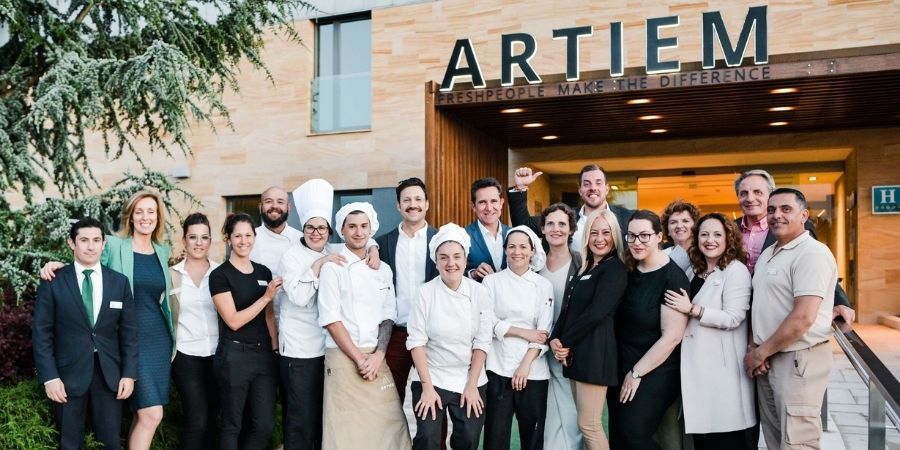When I think about this I wonder if I’m wrong. Perhaps I’m getting old or I’m not up with the times. Although I’m fifty eight, I feel young at heart and I’m still eager to keep learning and innovating.
My way of thinking - both at the personal and professional levels - has been shaped by the way I was brought up and educated. Like for everyone, many different experiences and circumstances have played a role in creating the person I am today. I would like to draw attention to three of these.
The first and most important is that I was lucky enough to be born into an entrepreneurial family. As I grew up, I learnt the value of hard work, of overcoming obstacles, of generosity, of respecting others, of improving every day, of persevering, of having a passion for what you do. I was raised to think about the prosperity of the community, to always be curious and keep learning, to take an optimistic approach to life, to see opportunities where others see danger and to be flexible and adaptable.
The second is that, thanks to my Catholic faith, I went to many different churches and cathedrals. Here I realised that these beautiful works of art took hundreds of years to build with different generations working together on one piece; and throughout this long period of time, the vision for what was being created remained strong. Hard work and resources paid off, culminating in a great building, though it is, of course, more than a mere building. As if that weren’t enough, over the years these places of worship survived earthquakes, wars, pandemics and more. And yet they are still as beautiful today as they were in the past.
Companies that last and adapt
The third takes me back to the mid-1990s when I read a book by Jim Collins and Jerry Porras. Built to Last goes into detail about why companies endure and how they adapt to the times. As Collins and Porras explain, the visionary businesses they looked at have a number of characteristics in common.
Clock building, not time telling
First, enduring companies are built by leaders who do not just want to create a great product or a company that revolves around them: they are instead interested in putting in place a system that will transcend their lives.
More than profits
We often hear that companies exist to make money and we do, of course, agree with that statement. If companies didn’t make money they wouldn’t exist. Nevertheless, visionary companies do something a little differently: money isn’t their primary motivation.
No tyranny of the 'or'
Most thinking about business strategy gives companies the choice between one of two options. This dichotomy sees businesses being forced to choose between, for instance, costs and differentiation, short term gain and long term profits, value for shareholders and the wellness of the global community, being conservative and being daring: the list goes on.
Nevertheless, the conclusions drawn in Built to Last show that visionary companies don’t have ‘either/or’ thinking, but instead skillfully combine both options. Doing so does not mean finding the midpoint between these options (which would be a mediocre solution), but rather harnessing creativity to achieve both. It’s not about A or B, nor finding a middle ground between A and B: it’s about having A and B at the same time.
Preserve the core /Stimulate progress
The visionary companies studied by Collins and Porras uphold their values in such a way that they transcend the lives of the founders (clock building). At the same time, the leadership of these businesses is creative and inventive: C-levels do not shy away from changing products, opening or closing production lines or anything else that is needed to adapt the company to meet market requirements. All the while, these decisions are made in respect of the company’s key values and ideology.

ARTIEM's values
These three points have helped me to shape my business philosophy, one that I seek to realise in ARTIEM: a business my wife and I founded in March 1993 with the aim of leaving a legacy for our children and one that society can be proud of.
All the above has led us to embrace the two principles that underpin our culture and about which I have written countless times:
- Creating value for all stakeholders is not only our responsibility as a business, it also helps us create a sustainable competitive advantage.
- We strive to make sure the ARTIEM Fresh People team are committed to and happy in their work. That they make guests - who expect excellent service - feel a sense of wellness and satisfaction. That they help us grow as a company.

This makes us think about building our future, our 21st-century cathedral called ARTIEM. Our hope is that in the coming years our VISION will come true, namely “to be a leading company with an inspiring and innovative model revolving around people’s happiness and a commitment to creating a prosperous environment.”
And just as Collins and Porras said in Built to Last, and which is also true of cathedrals, enduring companies transcend people. Therefore, when we will step down from leading ARTIEM in 2028, the company will have to keep developing, keep adapting and keep growing in line with the times.
Pepe Díaz
CEO of ARTIEM